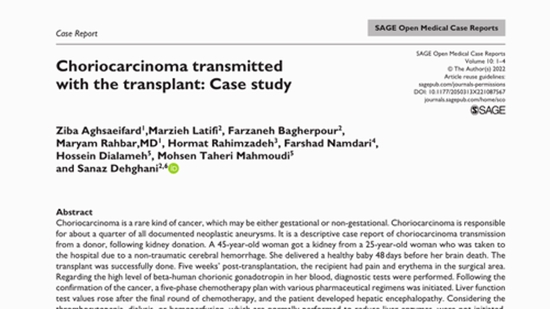Choriocarcinoma transmitted with the transplant: Case Study
Choriocarcinoma transmitted with the transplant: Case Study Choriocarcinoma is a rare kind of cancer that may be either gestational or non-gestational. The goal of this research is to report a case of choriocarcinoma transmission from the donor following kidney donation. A 45-year-old female received a kidney from a 25-year-old brain death referred to the hospital due to a cerebral hemorrhage of non-traumatic origin. She had a successful delivery 48 days before the brain death. The transplant was successfully performed.

Choriocarcinoma transmitted with the transplant: Case Study
Ziba Aghsaeifard, Farzaneh Bagherpour, Marzieh Latifi, Maryam Rahbar, Hormat Rahimzadeh, Farshad Namdari, Hossein Dialameh, Mohsen Taheri Mahmoudi, Sanaz Dehghani*
Abstract:
Choriocarcinoma is a rare kind of cancer that may be either gestational or non-gestational. Choriocarcinoma is responsible for around a quarter of all documented neoplastic aneurysms. The goal of this research is to report a case of choriocarcinoma transmission from the donor following kidney donation. A 45-year-old female received a kidney from a 25-year-old brain death referred to the hospital due to a cerebral hemorrhage of non-traumatic origin. She had a successful delivery 48 days before the brain death. The transplant was successfully performed.
Five weeks’ post-transplantation, the recipient was referred with a complaint of pain and erythema in the surgical area. Due to the high level of B-hCG in her blood, diagnostic tests were performed. Following confirmation of the cancer, a five-phase chemotherapy plan with various pharmaceutical regimens was initiated. Liver function test values rose after the final round of chemotherapy, and the patient developed hepatic encephalopathy. Due to the thrombocytopenia, dialysis or hemoperfusion, which are normally performed to reduce liver enzymes, were not initiated. Finally, she died due to the hepatic failure and DIC.
Although nephrologists disagree on the optimal course of treatment, it seems that nephrectomy would have been helpful in this instance. Physicians should be aware of the possibility of transplant-related choriocarcinoma in female donors of reproductive age who die of ICH for unclear reasons. Every donor must undergo a thorough examination. It is critical to get documents, clarify history, and interview relatives.
Keywords: Choriocarcinoma, Brain death, Organ donation



ارسال نظر